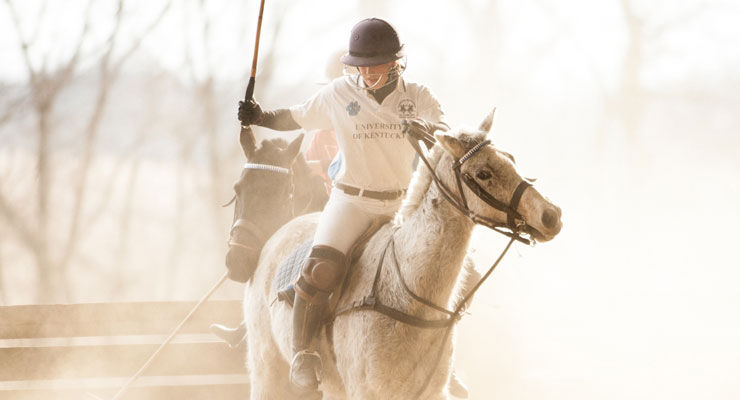Taking the reins
February 2, 2015
By Anne Halliwell
Photos by Adam Pennavaria
Hooves shifted restlessly as six women, helmeted and padded to protect their heads, knees and lower legs, waited for a softball-sized ball to hit the dirt. Minutes later, the calm was replaced by the sound of horses huffing and the thunk of mallet meeting ball, boot and saddle.
Rebecca Kozlowski, Emma Oakley and Monique Thomas-Whitehurst lined up Saturday afternoon against Virginia Tech’s polo players in the first chukker of the qualifying game.
The game began with short bursts of motion — the horses circled each other, kicking up dust, until the ball was launched out of the pack and one or two riders stretched their lead. That burst of speed only lasted until the horses reached a three to four-foot wall, however, and had to slow or risk injury.
Co-president and women’s varsity team captain Kozlowski scored 11 of the 19 points that earned UK their victory over the Polo Club at Virginia Tech.
Kozlowski leads the student-run team and is preparing to pass the reins over to Oakley, a digital and mass communications junior and her co-president, when she graduates at the end of the semester.
The two have been playing together for three years and have grown accustomed to their contrasting styles of play.
“Emma’s more attack, so she’s the one you know you want to get the ball to,” Kozlowski said. “I know when she’s going to hit it and I know to be there. I’m going to miss having that.”
Oakley said that Kozlowski’s more defensive style of play means that she can count on the senior player to be there in the background whenever needed.
“(Rebecca’s) played probably the longest … she’s very good at waiting and using the arena and being in the right place at the right time,” said Emily Meyer, who played on the polo team for three years before bowing out when her schedule became too busy for the Spring semester.
Meyer, a biology senior, added that Kozlowski has played indoor polo for her entire career in a fenced-in arena, which requires more strategy than playing in an open field.
Peter Taylor, who owns Westwood Farm where the polo teams house their horses and practice, said his two daughters played polo, which is why he built the barn and arena that the UK team uses now.
“They do everything by themselves,” he said. “They take care of their barn and their horses and the fields. They organize themselves and schedule their own practices and games.”
The team has been at Westwood Farm for three years.
Kozlowski makes the about half-hour drive from campus to Haley Road off of I-64 E five or six days a week, she said, to make sure that the horses are cared for.
“Without these horses, we would be nothing,” Kozlowski said. “This program would be nothing.”
There are 14 horses on Westwood Farm, Kozlowski said, donated by alumni and ex-polo players.
“We, as a club, (find it) very difficult for us to keep up with the big schools (like) UVA and Cornell,” Kozlowski said. “They have so much alumni, so much backing. We’re perfectly set in the middle.”
According to UK’s Equine Programs webpage, the women’s team won a national championship in the spring of 2010 and completed its season at the United States Polo Association National Intercollegiate Championships in 2011.
The players chased the ball across the dirt arena, earning points by knocking it against two high walls at either end of the polo arena.
The horses became extensions of the players’ strategy as the riders crowded each other into the walls or each other in the struggle to get to the ball.
“People like to say it’s like hockey on a horse,” Kozlowski said. “It’s like hockey, field hockey, with a little lacrosse.”
Like hockey, polo involves a lot of contact, with horses and riders slamming into each other throughout the game.
“The stirrups hurt, people get bruises,” Oakley added. “It’s a very aggressive sport.”
This only furthers the need for cooperation between horse and rider.
“In faster games, you basically need to trust your horse with your life,” Kozlowski said. “You have to be able to steer your horse in one hand, lean your body way over … you have to really be able to ride.”
Following team members’ cues is just as important as working in tandem with the horses.
“It’s more that you have to pay attention to which way Rebecca’s head is facing,” Oakley said. “If she’s looking left, you’d better go left.”
Oakley, who will graduate in the fall 2015 semester, was optimistic for the upcoming class of players but said the team will have an adjustment period when she takes over next fall.
“The other girls playing today will … be playing together for four years,” Oakley said of freshmen Whitehurst, an equine science management student, and Katie Elder, who alternated chukkers with Whitehurst and is studying chemical engineering. “We have girls who can get strong and play together.”
Kozlowski said she will miss playing the game, though she is confident that Oakley will take on the leadership role with ease. She said she may become one of the alumni who attends games and will still be able to support the team in one fashion or another.
“It’s been such a big part of my life,” Kozlowski said. “I can’t imagine not having it be part of it.”























































































































































